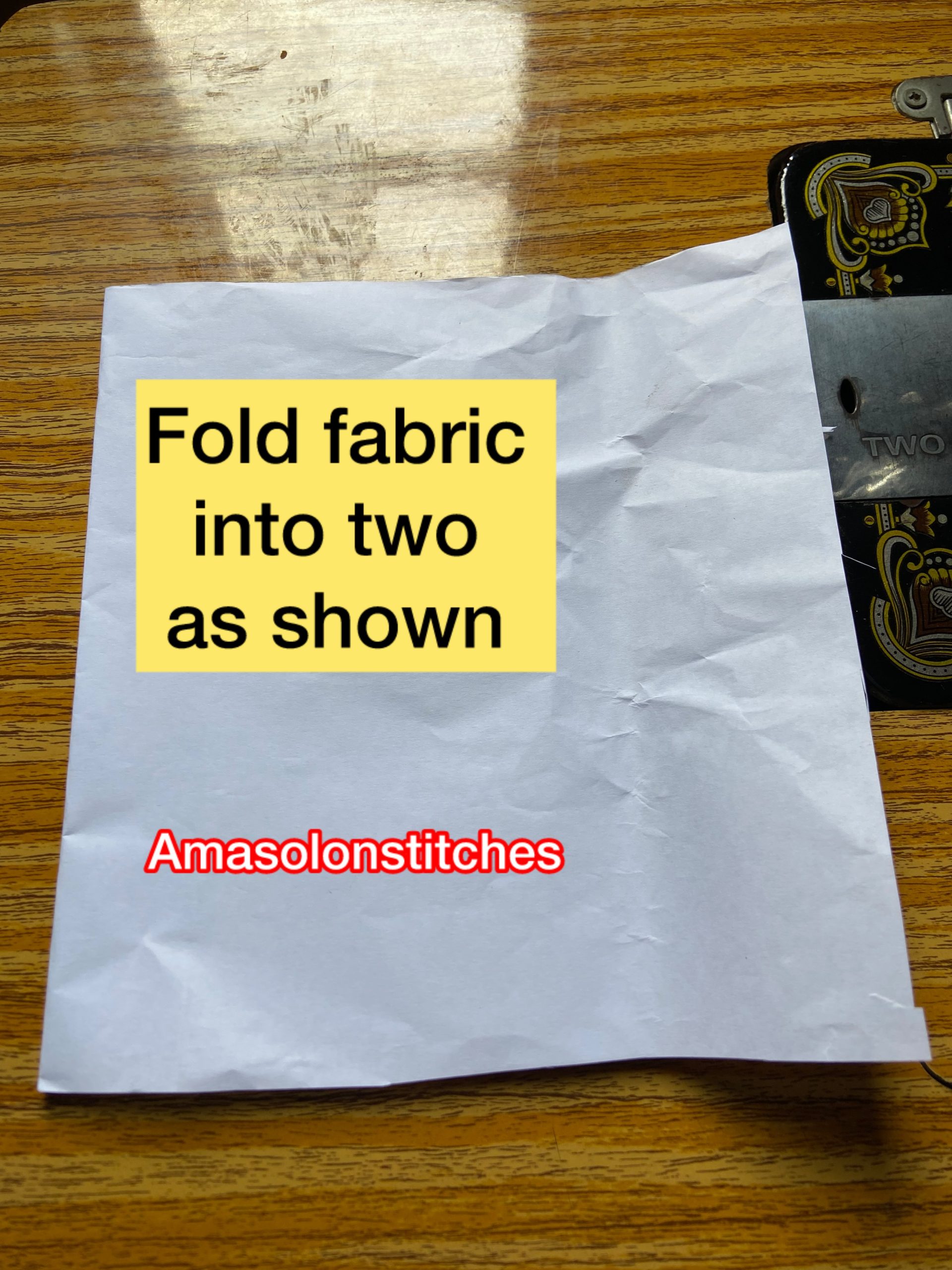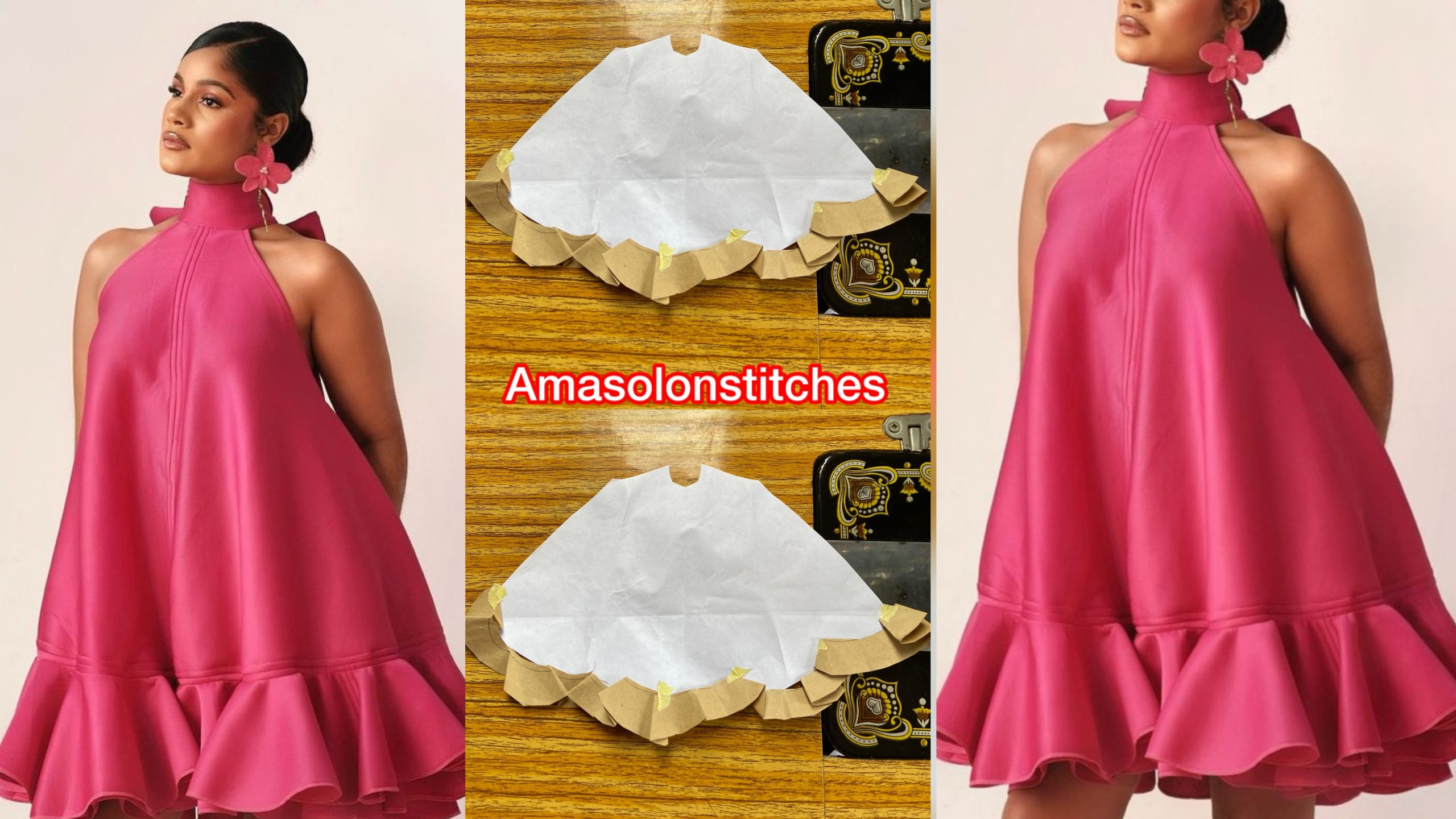Halter Neck Flare Dress with Ruffles Fashion Illustration Tutorial
The halter neck flare dress with ruffles is a stunning example of how timeless elegance meets contemporary fashion. Characterized by its neckline that fastens around the neck, flared silhouette, and playful ruffle details, this garment has evolved from vintage inspirations and traditional African textiles to grace modern runways and street styles alike.
Popular for its universally flattering fit and graceful movement, the halter neck flare dress with ruffles is perfect for a wide variety of body types. Whether you’re dressing for a wedding, a cocktail party, or a cultural event, this dress style can be adapted to suit both casual and formal occasions.
For fashion students, designers, and hobbyists, mastering the creation of this garment is not only a technical milestone but also a creative exploration. Understanding its design elements opens doors to more complex draping and pattern adaptations in future projects.
Understanding the Style
Key Characteristics:
- Neckline: Tied or clasped around the neck, often leaving the back and shoulders bare.
- Silhouette: Fitted bodice flowing into a dramatic flare below the waist.
- Fabric Movement: Best achieved with lightweight, flowing fabrics.
- Ruffles: Adds volume, femininity, and movement, typically featured on the hem, neckline, or cascading along the skirt.
Cultural and Modern Influences:
- African designers incorporate Ankara, Adire, and Kente fabrics into this design.
- Western fashion brings in chiffon, crepe, and silk blends for a softer drape.
Comparison with Similar Styles:
| Style | Halter Neck Flare Dress | Kaftan | Kimono Dress | Maxi Dress |
|---|---|---|---|---|
| Fit | Fitted bodice, flared skirt | Loose, flowy | Loose with sash | Fitted or loose |
| Neckline | Halter | Round/V-neck | V-neck or wrap | Varies |
| Occasion | Versatile | Casual to formal | Casual to formal | Versatile |
| Skill Level | Intermediate | Beginner | Beginner | Intermediate |
Materials and Tools Required
Recommended Fabrics:
- Chiffon
- Silk
- Crepe
- Cotton lawn
- Ankara (for Afrocentric looks)
Essential Tools:
- Sewing machine
- Fabric scissors
- Pins and needles
- Measuring tape
- Pattern paper
- Ruler and French curve
- Tailor’s chalk
Optional Enhancements:
- Beads and sequins
- Embroidery thread
- Lining fabric
- Iron-on interfacing
Halter Neck Flare Dress with Ruffles Illustration Tutorial










- Silhouette Sketching:
- Begin with a basic croquis (fashion figure).
- Sketch the halter neckline as it wraps behind the neck.
- Draw the flared skirt cascading from the waist, with ruffles along the hem.
- Depicting Fabric Drape:
- Use soft, curved lines to show fabric flow and movement.
- Indicate ruffles with layered, wavy lines.
- Color Rendering Tips:
- Choose light washes for sheer fabrics.
- Add highlights to emphasize volume and movement.
- Moodboard Creation:
- Include swatches, trims, inspiration images, and color themes.
Pattern-Making and Sewing Process
1. Drafting the Bodice Pattern:
- Begin with a basic bodice block.
- Modify neckline into a halter shape: deep cut front, straps extended to tie or clasp at neck.
- Remove shoulder seams and adjust for bust shaping.
2. Creating the Flared Skirt:
- Use a full circle or half-circle skirt pattern for maximum flare.
- Add extra width at hem if needed for dramatic effect.
3. Designing the Ruffles:
- Draft ruffles as circular or spiral strips depending on volume desired.
- Seam allowance: Add at least 0.5″ all around.
4. Sewing the Dress:
- Interface neckline area for support.
- Stitch bodice and skirt separately, then join.
- Hem ruffles with a rolled hem or baby hem.
- Attach ruffles to designated edges.
Pro Tips:
- Use lightweight interfacing for delicate fabrics.
- Stay-stitch neckline to prevent stretching.
- Test ruffle volume on muslin before cutting final fabric.
Styling the Halter Neck Flare Dress with Ruffles
Occasions and Styling Tips:
- Casual Wear: Pair with flat sandals, minimal jewelry, and a crossbody bag.
- Formal Events: Style with heels, bold earrings, and a clutch bag.
- Cultural/Festive Occasions: Opt for Ankara fabric, gele or head wrap, and layered bangles.
Accessory Pairings:
- Belts to cinch the waist.
- Hoop or statement earrings.
- Layered necklaces for low neckline variants.
Fabric Personality:
- Chiffon/Silk: Romantic and flowing.
- Cotton: Crisp and structured.
- Ankara: Bold and expressive.
Estimated Costs of Making the Dress
| Item | Estimated Cost (USD) |
| Fabric (3-4 yards) | $15 – $40 |
| Lining fabric | $5 – $10 |
| Thread | $2 |
| Pattern paper | $3 |
| Sewing notions (zip, interfacing) | $5 – $10 |
| Embellishments (optional) | $5 – $15 |
| Total Estimated Budget | $30 – $80 |
Budget Alternatives:
- Use discounted remnants for practice.
- Repurpose old dresses for fabric.
Care and Maintenance
- Washing: Hand-wash or use gentle machine cycle.
- Drying: Air dry flat or hang.
- Ironing: Low heat for delicate fabrics; use a pressing cloth.
- Storage: Hang on padded hangers to preserve shape.
Step-by-Step Guide After Completing Your First Halter Neck Flare Dress
1. Documenting Your Work:
- Take well-lit photos from different angles.
- Use neutral backgrounds to emphasize garment details.
2. Portfolio Presentation:
- Include illustrations, fabric swatches, and construction notes.
- Highlight your design process and unique styling.
3. Selling or Gifting:
- List on platforms like Etsy or Instagram.
- Package with branding tags and care instructions.
4. Future Projects:
- Experiment with color-blocking or sleeve variations.
- Try the same pattern with different fabric types.
Common Challenges and Practical Tips
Fabric Management:
- Pin generously and handle gently.
Neckline Distortion:
- Stay-stitch and stabilize neckline before sewing.
Ruffle Attachment:
- Baste first before final stitching.
- Use gathering foot if available.
Flattering Fit:
- Ensure proper bust shaping.
- Balance ruffle volume to avoid overwhelming frame.
Special Considerations
Adaptations for All Body Types:
- Plus-size: Add bust darts and waist shaping for definition.
- Petite: Shorten length and reduce flare volume.
- Disability Friendly: Add side zippers or front closures for ease.
- Gender-Neutral: Use solid colors and less volume for a more unisex look.
Comparison Table: Halter Neck Flare Dress vs. Other Flowy Styles
| Feature | Halter Flare Dress | Kaftan | Maxi Dress | Kimono Dress |
| Sewing Difficulty | Intermediate | Beginner | Intermediate | Beginner |
| Versatility | High | Moderate | High | Moderate |
| Cultural Influence | African/Western | African/Middle East | Global | Japanese/Global |
| Occasion Range | Casual to Formal | Casual to Festive | Casual to Formal | Lounge to Formal |

